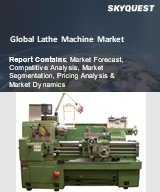
|
시장보고서
상품코드
1722679
선반 기계 시장 보고서 : 유형별, 오퍼레이션별, 생산능력별, 최종사용자별, 지역별(2025-2033년)Lathe Machines Market Report by Type, Operation, Capacity, End User, and Region 2025-2033 |
||||||
세계 선반 기계 시장 규모는 2024년 263억 달러에 달했습니다. 향후 IMARC Group은 2033년까지 이 시장이 388억 달러에 달하고, 2025-2033년 연평균 성장률(CAGR)은 4.19%를 보일 것으로 예측됩니다.
선반 기계는 금속, 목재 및 기타 재료를 원하는 모양과 크기로 성형하는 데 사용됩니다. 이 기계는 공작물의 회전 원리로 작동하며, facing, centering, chamfering, knurling, drilling, boring, reaming, tapping, thread cutting, parting off에 도움이 되는 고정 절삭 공구를 이용합니다. 다리, 침대, 척, 앞치마, 주축대, 심압대, 심압대, 캐리지, 안장, 안장, 크로스 슬라이드, 복합대, 칼날대, 리드 스크류, 리드 스크류, 피드로드, 주축으로 구성됩니다. 현재 선반 가공, 금속 방적 가공, 용사 가공, 유리 가공, 부품 재생 등 다양한 용도로 사용되고 있습니다.
선반 기계 시장 동향 :
선반 기계는 제품의 균일성을 높이고 밸류체인을 개선하기 위해 산업 자동화 및 정밀 제조 증가 추세는 시장 성장을 가속하는 주요 요인 중 하나입니다. 또한, 선반 기계는 고속, 정확성 및 운영 비용 절감으로 인해 다양한 의료용 임플란트 및 장비 제조에 활용되고 있습니다. 이와는 별도로, 첨단 안전 기능을 갖춘 저연비 자동차에 대한 수요가 증가함에 따라 다양한 자동차 부품의 성형에 선반 기계 채택이 촉진되고 있습니다. 기술 전문성, 저렴한 노동력, 낮은 원자재 비용으로 인해 여러 외국 기업이 중국, 인도 등 신흥국에 제조 시설을 설립하고 있습니다. 이는 제조업체가 소비자 기반을 확대하고 경쟁력을 유지할 수 있는 유리한 기회를 창출하고 있습니다. 또한, 4차 산업혁명(인더스트리 4.0)의 출현은 선반 기계에 사물인터넷(IoT)의 통합을 촉진하고 있으며, 이는 시장을 주도할 것으로 예측됩니다.
본 보고서에서 다룬 주요 질문
- 2024년 세계 선반 기계 시장 규모는?
- 2025-2033년 선반 기계 세계 시장 성장률 전망은?
- 세계 선반 기계 시장을 주도하는 주요 요인은?
- 코로나19가 세계 선반 기계 시장에 미치는 영향은?
- 세계 시장에서 선반 기계의 유형별 분류는?
- 세계 선반 기계 시장의 작업별 구분은?
- 선반기계 세계 시장을 생산능력별로 구분하면?
- 세계 선반 기계 시장의 최종 사용자별 시장 분석은?
- 세계 선반 기계 시장의 주요 지역은?
- 세계 선반 기계 시장의 주요 기업은?
목차
제1장 서문
제2장 조사 범위와 조사 방법
- 조사 목적
- 이해관계자
- 데이터 소스
- 1차 정보
- 2차 정보
- 시장 추정
- 보텀업 접근
- 톱다운 접근
- 조사 방법
제3장 주요 요약
제4장 서론
- 개요
- 주요 업계 동향
제5장 세계의 선반 기계 시장
- 시장 개요
- 시장 실적
- COVID-19의 영향
- 시장 예측
제6장 시장 분석 : 유형별
- 수직 선반
- 수평 선반
제7장 시장 분석 : 오퍼레이션
- 기존 선반
- CNC 선반
제8장 시장 분석 : 생산능력별
- Heavy Duty
- Medium Duty
- Low Duty
제9장 시장 분석 : 최종사용자별
- 자동차
- 일반 제조업
- 운송
- 기타
제10장 시장 분석 : 지역별
- 북미
- 미국
- 캐나다
- 아시아태평양
- 중국
- 일본
- 인도
- 한국
- 호주
- 인도네시아
- 기타
- 유럽
- 독일
- 프랑스
- 영국
- 이탈리아
- 스페인
- 러시아
- 기타
- 라틴아메리카
- 브라질
- 멕시코
- 기타
- 중동 및 아프리카
- 시장 내역 : 국가별
제11장 SWOT 분석
- 개요
- 강점
- 약점
- 기회
- 위협
제12장 밸류체인 분석
제13장 Porter의 Five Forces 분석
- 개요
- 바이어의 교섭력
- 공급 기업의 교섭력
- 경쟁 정도
- 신규 진출업체의 위협
- 대체품의 위협
제14장 가격 분석
제15장 경쟁 구도
- 시장 구조
- 주요 기업
- 주요 기업 개요
- DMG Mori Co. Ltd
- Doosan Machine Tools Co. Ltd.
- EMAG GmbH & Co. KG
- Fair Friend Group
- Haas Automation Inc.
- Hardinge Inc.
- HMT Machine Tools Limited(HMT Limited)
- Hurco Companies Inc.
- JTEKT Corporation
- Macpower CNC Machines Limited
- Mazak Corporation
- Okuma Corporation
- SMEC CO. LTD
The global lathe machines market size reached USD 26.3 Billion in 2024. Looking forward, IMARC Group expects the market to reach USD 38.8 Billion by 2033, exhibiting a growth rate (CAGR) of 4.19% during 2025-2033.
Lathe machines are used to shape metal, wood and other materials into desired shapes and sizes. These machines operate on the rotating workpiece principle and utilize fixed cutting tools that help in facing, centering, chamfering, knurling, drilling, boring, reaming, tapping, thread cutting and parting off. They comprise leg, bed, chuck, apron, headstock, tailstock, carriage, saddle, cross-slide, compound rest, tool post, lead screw, feed rod and main spindle. At present, they find extensive applications in woodturning, metal spinning, thermal spraying, glass working and parts reclamation.
Lathe Machines Market Trends:
The growing trend of industrial automation and precision manufacturing represents one of the major factors bolstering the market growth as lathe machines enhance product uniformity and improve the value chain. Moreover, lathe machines are gaining traction in manufacturing various medical implants and equipment on account of their high speed, accuracy and reduced operating costs. Apart from this, the escalating demand for fuel-efficient automobiles with advanced safety features is promoting the adoption of lathe machines for forming different parts of vehicles. Due to the availability of technical expertise, cheap labor and low raw material costs, several foreign firms are setting up their manufacturing facilities in emerging countries like China and India. This is creating lucrative opportunities for manufacturers to expand their consumer base and maintain a competitive edge. Furthermore, the emergence of the Fourth Industry Revolution (Industry 4.0) is encouraging the integration of the Internet of Things (IoT) in lathe machines, which is anticipated to drive the market.
Key Market Segmentation:
Breakup by Type:
- Vertical Lathes
- Horizontal Lathes
Breakup by Operation:
- Conventional Lathes
- CNC Lathes
Breakup by Capacity:
- Heavy Duty
- Medium Duty
- Low Duty
Breakup by End User:
- Automotive
- General Manufacturing
- Transportation
- Others
Breakup by Region:
- North America
- United States
- Canada
- Asia-Pacific
- China
- Japan
- India
- South Korea
- Australia
- Indonesia
- Others
- Europe
- Germany
- France
- United Kingdom
- Italy
- Spain
- Russia
- Others
- Latin America
- Brazil
- Mexico
- Others
- Middle East and Africa
Competitive Landscape:
The competitive landscape of the industry has also been examined along with the profiles of the key players being DMG Mori Co. Ltd, Doosan Machine Tools Co. Ltd., EMAG GmbH & Co. KG, Fair Friend Group, Haas Automation Inc., Hardinge Inc., HMT Machine Tools Limited (HMT Limited), Hurco Companies Inc., JTEKT Corporation, Macpower CNC Machines Limited, Mazak Corporation, Okuma Corporation and SMEC CO. LTD.
Key Questions Answered in This Report
- 1.What was the size of the global lathe machines market in 2024?
- 2.What is the expected growth rate of the global lathe machines market during 2025-2033?
- 3.What are the key factors driving the global lathe machines market?
- 4.What has been the impact of COVID-19 on the global lathe machines market?
- 5.What is the breakup of the global lathe machines market based on the type?
- 6.What is the breakup of the global lathe machines market based on the operation?
- 7.What is the breakup of the global lathe machines market based on the capacity?
- 8.What is the breakup of the global lathe machines market based on the end user?
- 9.What are the key regions in the global lathe machines market?
- 10.Who are the key players/companies in the global lathe machines market?
Table of Contents
1 Preface
2 Scope and Methodology
- 2.1 Objectives of the Study
- 2.2 Stakeholders
- 2.3 Data Sources
- 2.3.1 Primary Sources
- 2.3.2 Secondary Sources
- 2.4 Market Estimation
- 2.4.1 Bottom-Up Approach
- 2.4.2 Top-Down Approach
- 2.5 Forecasting Methodology
3 Executive Summary
4 Introduction
- 4.1 Overview
- 4.2 Key Industry Trends
5 Global Lathe Machines Market
- 5.1 Market Overview
- 5.2 Market Performance
- 5.3 Impact of COVID-19
- 5.4 Market Forecast
6 Market Breakup by Type
- 6.1 Vertical Lathes
- 6.1.1 Market Trends
- 6.1.2 Market Forecast
- 6.2 Horizontal Lathes
- 6.2.1 Market Trends
- 6.2.2 Market Forecast
7 Market Breakup by Operation
- 7.1 Conventional Lathes
- 7.1.1 Market Trends
- 7.1.2 Market Forecast
- 7.2 CNC Lathes
- 7.2.1 Market Trends
- 7.2.2 Market Forecast
8 Market Breakup by Capacity
- 8.1 Heavy Duty
- 8.1.1 Market Heavy Duty Trends
- 8.1.2 Market Forecast
- 8.2 Medium Duty
- 8.2.1 Market Trends
- 8.2.2 Market Forecast
- 8.3 Low Duty
- 8.3.1 Market Trends
- 8.3.2 Market Forecast
9 Market Breakup by End User
- 9.1 Automotive
- 9.1.1 Market Trends
- 9.1.2 Market Forecast
- 9.2 General Manufacturing
- 9.2.1 Market Trends
- 9.2.2 Market Forecast
- 9.3 Transportation
- 9.3.1 Market Trends
- 9.3.2 Market Forecast
- 9.4 Others
- 9.4.1 Market Trends
- 9.4.2 Market Forecast
10 Market Breakup by Region
- 10.1 North America
- 10.1.1 United States
- 10.1.1.1 Market Trends
- 10.1.1.2 Market Forecast
- 10.1.2 Canada
- 10.1.2.1 Market Trends
- 10.1.2.2 Market Forecast
- 10.1.1 United States
- 10.2 Asia-Pacific
- 10.2.1 China
- 10.2.1.1 Market Trends
- 10.2.1.2 Market Forecast
- 10.2.2 Japan
- 10.2.2.1 Market Trends
- 10.2.2.2 Market Forecast
- 10.2.3 India
- 10.2.3.1 Market Trends
- 10.2.3.2 Market Forecast
- 10.2.4 South Korea
- 10.2.4.1 Market Trends
- 10.2.4.2 Market Forecast
- 10.2.5 Australia
- 10.2.5.1 Market Trends
- 10.2.5.2 Market Forecast
- 10.2.6 Indonesia
- 10.2.6.1 Market Trends
- 10.2.6.2 Market Forecast
- 10.2.7 Others
- 10.2.7.1 Market Trends
- 10.2.7.2 Market Forecast
- 10.2.1 China
- 10.3 Europe
- 10.3.1 Germany
- 10.3.1.1 Market Trends
- 10.3.1.2 Market Forecast
- 10.3.2 France
- 10.3.2.1 Market Trends
- 10.3.2.2 Market Forecast
- 10.3.3 United Kingdom
- 10.3.3.1 Market Trends
- 10.3.3.2 Market Forecast
- 10.3.4 Italy
- 10.3.4.1 Market Trends
- 10.3.4.2 Market Forecast
- 10.3.5 Spain
- 10.3.5.1 Market Trends
- 10.3.5.2 Market Forecast
- 10.3.6 Russia
- 10.3.6.1 Market Trends
- 10.3.6.2 Market Forecast
- 10.3.7 Others
- 10.3.7.1 Market Trends
- 10.3.7.2 Market Forecast
- 10.3.1 Germany
- 10.4 Latin America
- 10.4.1 Brazil
- 10.4.1.1 Market Trends
- 10.4.1.2 Market Forecast
- 10.4.2 Mexico
- 10.4.2.1 Market Trends
- 10.4.2.2 Market Forecast
- 10.4.3 Others
- 10.4.3.1 Market Trends
- 10.4.3.2 Market Forecast
- 10.4.1 Brazil
- 10.5 Middle East and Africa
- 10.5.1 Market Trends
- 10.5.2 Market Breakup by Country
- 10.5.3 Market Forecast
11 SWOT Analysis
- 11.1 Overview
- 11.2 Strengths
- 11.3 Weaknesses
- 11.4 Opportunities
- 11.5 Threats
12 Value Chain Analysis
13 Porters Five Forces Analysis
- 13.1 Overview
- 13.2 Bargaining Power of Buyers
- 13.3 Bargaining Power of Suppliers
- 13.4 Degree of Competition
- 13.5 Threat of New Entrants
- 13.6 Threat of Substitutes
14 Price Analysis
15 Competitive Landscape
- 15.1 Market Structure
- 15.2 Key Players
- 15.3 Profiles of Key Players
- 15.3.1 DMG Mori Co. Ltd
- 15.3.1.1 Company Overview
- 15.3.1.2 Product Portfolio
- 15.3.1.3 Financials
- 15.3.2 Doosan Machine Tools Co. Ltd.
- 15.3.2.1 Company Overview
- 15.3.2.2 Product Portfolio
- 15.3.3 EMAG GmbH & Co. KG
- 15.3.3.1 Company Overview
- 15.3.3.2 Product Portfolio
- 15.3.4 Fair Friend Group
- 15.3.4.1 Company Overview
- 15.3.4.2 Product Portfolio
- 15.3.5 Haas Automation Inc.
- 15.3.5.1 Company Overview
- 15.3.5.2 Product Portfolio
- 15.3.6 Hardinge Inc.
- 15.3.6.1 Company Overview
- 15.3.6.2 Product Portfolio
- 15.3.7 HMT Machine Tools Limited (HMT Limited)
- 15.3.7.1 Company Overview
- 15.3.7.2 Product Portfolio
- 15.3.8 Hurco Companies Inc.
- 15.3.8.1 Company Overview
- 15.3.8.2 Product Portfolio
- 15.3.8.3 Financials
- 15.3.9 JTEKT Corporation
- 15.3.9.1 Company Overview
- 15.3.9.2 Product Portfolio
- 15.3.10 Macpower CNC Machines Limited
- 15.3.10.1 Company Overview
- 15.3.10.2 Product Portfolio
- 15.3.10.3 Financials
- 15.3.11 Mazak Corporation
- 15.3.11.1 Company Overview
- 15.3.11.2 Product Portfolio
- 15.3.12 Okuma Corporation
- 15.3.12.1 Company Overview
- 15.3.12.2 Product Portfolio
- 15.3.13 SMEC CO. LTD
- 15.3.13.1 Company Overview
- 15.3.13.2 Product Portfolio
- 15.3.13.3 Financials
- 15.3.1 DMG Mori Co. Ltd



















